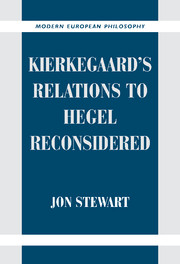Book contents
- Frontmatter
- Contents
- Acknowledgements
- Abbreviations of Primary Texts
- Preface
- Introduction
- 1 Kierkegaard and Danish Hegelianism
- 2 Traces of Hegel in From the Papers of One Still Living and the Early Works
- 3 The Ironic Thesis and Hegel's Presence in The Concept of Irony
- 4 Hegel's Aufhebung and Kierkegaard's Either/Or
- 5 Kierkegaard's Polemic with Martensen in Johannes Climacus, or De omnibus dubitandum est
- 6 Kierkegaard's Repetition and Hegel's Dialectical Mediation
- 7 Hegel's View of Moral Conscience and Kierkegaard's Interpretation of Abraham
- 8 Martensen's Doctrine of Immanence and Kierkegaard's Transcendence in the Philosophical Fragments
- 9 The Dispute with Adler in The Concept of Anxiety
- 10 The Polemic with Heiberg in Prefaces
- 11 Subjective and Objective Thinking: Hegel in the Concluding Unscientific Postscript
- 12 Adler's Confusions and the Results of Hegel's Philosophy
- 13 Kierkegaard's Phenomenology of Despair in The Sickness unto Death
- 14 Kierkegaard and the Development of Nineteenth-Century Continental Philosophy: Conclusions, Reflections, and Reevaluations
- Foreign Language Summaries
- Bibliographies
- Subject Index
- Index of Persons
9 - The Dispute with Adler in The Concept of Anxiety
Published online by Cambridge University Press: 13 March 2010
- Frontmatter
- Contents
- Acknowledgements
- Abbreviations of Primary Texts
- Preface
- Introduction
- 1 Kierkegaard and Danish Hegelianism
- 2 Traces of Hegel in From the Papers of One Still Living and the Early Works
- 3 The Ironic Thesis and Hegel's Presence in The Concept of Irony
- 4 Hegel's Aufhebung and Kierkegaard's Either/Or
- 5 Kierkegaard's Polemic with Martensen in Johannes Climacus, or De omnibus dubitandum est
- 6 Kierkegaard's Repetition and Hegel's Dialectical Mediation
- 7 Hegel's View of Moral Conscience and Kierkegaard's Interpretation of Abraham
- 8 Martensen's Doctrine of Immanence and Kierkegaard's Transcendence in the Philosophical Fragments
- 9 The Dispute with Adler in The Concept of Anxiety
- 10 The Polemic with Heiberg in Prefaces
- 11 Subjective and Objective Thinking: Hegel in the Concluding Unscientific Postscript
- 12 Adler's Confusions and the Results of Hegel's Philosophy
- 13 Kierkegaard's Phenomenology of Despair in The Sickness unto Death
- 14 Kierkegaard and the Development of Nineteenth-Century Continental Philosophy: Conclusions, Reflections, and Reevaluations
- Foreign Language Summaries
- Bibliographies
- Subject Index
- Index of Persons
Summary
On June 17, 1844, only four days after the Philosophical Fragments was published, two new works appeared, The Concept of Anxiety and Prefaces. Both texts seem to contain a polemic against Hegel and specific Hegelians. This was, generally speaking, a period of particular philosophical ferment for Kierkegaard as is evinced by many passages in the journals and papers. The Concept of Anxiety mentions Hegel by name several times and seems to be generally more openly polemical with him than the Philosophical Fragments. The theme of the work is the issue of hereditary sin, which is indicated by the subtitle, “A Simple Psychologically Orienting Deliberation on the Dogmatic Issue of Hereditary Sin.” In his Introduction, Kierkegaard's pseudonymous author, Vigilius Haufniensis, explains the subject-matter of the treatise as follows: “The present work has set as its task the psychological treatment of the concept of ‘anxiety’ but in such a way that it constantly keeps in mente and before its eye the dogma of hereditary sin.” In the discussion of sin, a number of other philosophical issues are touched upon, such as freedom of the will, and a number of philosophical fields are explored, such as philosophical anthropology and psychology. This clearly makes The Concept of Anxiety one of Kierkegaard's more philosophical works.
Many scholars have seen the criticisms offered in The Concept of Anxiety as being directed against Hegel. Thulstrup characterizes this as “the book's whole anti-Hegelian perspective.”
- Type
- Chapter
- Information
- Kierkegaard's Relations to Hegel Reconsidered , pp. 378 - 418Publisher: Cambridge University PressPrint publication year: 2003

